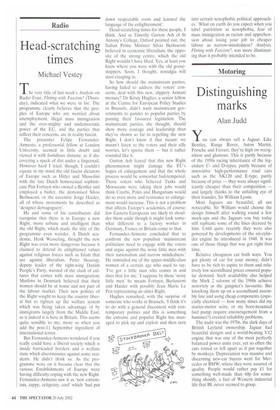Head-scratching times
Michael Vestey
The very title of last week's Analysis on Radio Four, Flirting with Fascism? (Thursday), indicated what we were in for, The programme clearly believes that the peoples of Europe who are worried about unemployment, illegal mass immigration and the over-mighty and undemocratic power of the EU, and the parties that reflect their concerns, are in reality fascist.
The presenter Felipe FernandezArmesto, a professorial fellow at London University, seemed in little doubt and viewed it with fastidious distaste, as if discovering a speck of dirt under a fingernail. However hard I tried, though, I couldn't equate in my mind the old fascist dictators of Europe such as Hitler and Mussolini with the late Dutch homosexual sophisticate Pim Fortuyn who owned a Bentley and employed a butler, the demonised Silvio Berlusconi, or the eccentric Jorge Haider, all of whose movements he described as 'designer demagoguery'.
He and some of his contributors did recognise that there is in Europe a new Right, more urbane and intelligent than the old Right, which made the title of the programme even weirder. A Dutch academic, Henk Wesseling, thought the new Right was even more dangerous because it claimed to defend its enlightened values against religious forces such as Islam that are against liberalism. Peter Skaarup, deputy leader of the right-wing Danish People's Party, warned of the clash of cultures that comes with mass immigration; Muslims in Denmark believed that their women should be at home and not part of the labour market. Their new politics of the Right sought to keep the country liberal but to tighten up the welfare system which was being taken advantage of by immigrants largely from the Middle East, as it indeed it is here in Britain. This seems quite sensible to me: more so when you add the post-11 September ingredient of international terror.
But Fernandez-Armesto wondered if you really could have a liberal society which is inside barricaded borders and a welfare state which discriminates against some residents. He didn't think so. As the programme wore on it became clear that the various Establishments of Europe were having difficulty coping with the new Right. Fernandez-Armesto saw it as 'new extremism, zappy, zeitgeisty, cool' which 'had put down respectable roots and learned the language of the enlightenment'.
Head-scratching times for these people, I think. And as Timothy Garton Ash of St Antony's College, Oxford pointed out, the Italian Prime Minister Silvio Berlusconi believed in economic liberalism, the opposite of the strong centre, which the old Right wouldn't have liked. Yes, at least you knew where you were with the old goosesteppers. Soon, I thought, nostalgia will start creeping in.
So how should the mainstream parties, having failed to address the voters' concerns, deal with this new, slippery Armani menace? Dr Kirsty Hughes, a senior fellow at the Centre for European Policy Studies in Brussels, didn't want mainstream governments to pander to populist parties by passing their favoured legislation. The mainstream parties, she thought, should show more courage and leadership than they've shown so far in repelling the new Right. I don't know if that meant: we mustn't listen to the voters and their silly worries, let's ignore them but it rather sounded like it.
Garton Ash feared that this new Right phenomenon might damage the EU's hopes of enlargement and that the whole process would be somewhat bad-tempered. Those voters who believed Turks and Moroccans were taking their jobs would think Czechs. Poles and Hungarians would do so even more and resistance to enlargement would increase. This is not a problem that affects Europe's academics, of course; few Eastern Europeans are likely to shoulder them aside though it might look somewhat different to a factory worker in Germany, France or Britain come to that.
Fernandez-Armesto concluded that to confront the new populism 'mainstream politicians need to engage with the voters and argue against the noisy little men with their nationalism and narrow mindedness.' He reminded me of the upper-middle-class women of a certain age who used to say, 'I've got a little man who comes in and does that for me.' I suppose by these 'noisy little men' he means Fortuyn, Berlusconi and Haider with possibly Jean Marie Le Pen representing an older Right.
Hughes remarked, with the surprise of someone who works in Brussels, 'I think it's to do with a general discontent with contemporary politics and this is something the extreme and populist Right has managed to pick up and exploit and then turn into certain xenophobic political approaches.' What on earth do you expect when you label patriotism as xenophobia, fear of mass immigration as racism and apprehension about losing your job to cheaper labour as narrow-mindedness? Analysis, Flirting with Fascism?, was more illuminating than it probably intended to be.


























































 Previous page
Previous page